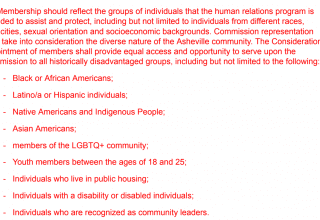The Asheville City Council has amended the membership and appointment criteria for the Human Relations Commission of Asheville (HRCA).
Created in 2018, the HRCA was designed to promote human relations and advise the City Council on issues of equity and inclusion. Its original bylaws required that specific quotas be filled by individuals representing certain demographics, including African Americans, Latinx residents, LGBTQ individuals, youth, residents from each city district, and people with disabilities.
In 2022, facing difficulties filling vacancies, the City Council reduced the commission from 15 seats to 9. With some quotas removed, the city maintained race and identity-based preferences when evaluating applicants.
John Miall, who spent nearly three decades working for the City of Asheville, applied in early 2023 to serve on the HRCA. His application was denied, leading Miall and four others to sue the city, alleging they were rejected because they are white.
The five plaintiffs working with the Pacific Legal Foundation claim in there lawsuit that Asheville’s HRCA membership rules unlawfully discriminate and prevent qualified applicants from serving on the city advisory board.
“No government commission or committee should use an individual’s race or ethnicity to determine who gets the opportunity to serve their public,” the lawsuit states.
On Friday, attorneys for both sides submitted a proposed consent decree that, if approved by a judge, would end the case. Asheville must ensure equal opportunity on the HRCA by administering appointments without regard to race, ethnicity, or national origin.
At Tuesday’s Asheville City Council meeting the item was brought up for consideration, striking the discriminatory language from the membership criteria. Democrat Mayor Esther Manheimer described the change as necessary with the “new regime” in Washington, D.C.
“As most people know, we have a change in leadership in Washington and a cancellation of all things DEI. And unfortunately, we are being sued over this, the way we’ve worded the appointment process for this committee,” said Manheimer. “We do have to make these changes or we could potentially be facing long litigation that we’re likely to not prevail on and end up incurring attorney’s fees and paying the other side’s attorney’s fees. So sometimes we have to be pragmatic in the way that we resolve things to save tax dollars.”
Not all council members supported the change. Councilwoman Kim Roney voted against it, saying the city must continue the fight.
“I will add that sometimes we can’t do anything and sometimes we should do what we can, like fighting for human and civil rights and our constitutional rights. And that’s something that our community needs us to do,” said Roney.
Lead attorney Andrew Quinio of the Pacific Legal Foundation called the outcome a significant milestone.
“This is a victory not just for our clients, but for every resident of Asheville who values equal treatment under the law. The government has no business telling people they can’t serve their community because of the color of their skin,” said Quinio.
The post Asheville agrees to eliminate race-based commission criteria first appeared on Carolina Journal.
The post Asheville agrees to eliminate race-based commission criteria appeared first on First In Freedom Daily.
Click this link for the original source of this article.
Author: NIck Craig
This content is courtesy of, and owned and copyrighted by, https://firstinfreedomdaily.com and its author. This content is made available by use of the public RSS feed offered by the host site and is used for educational purposes only. If you are the author or represent the host site and would like this content removed now and in the future, please contact USSANews.com using the email address in the Contact page found in the website menu.





